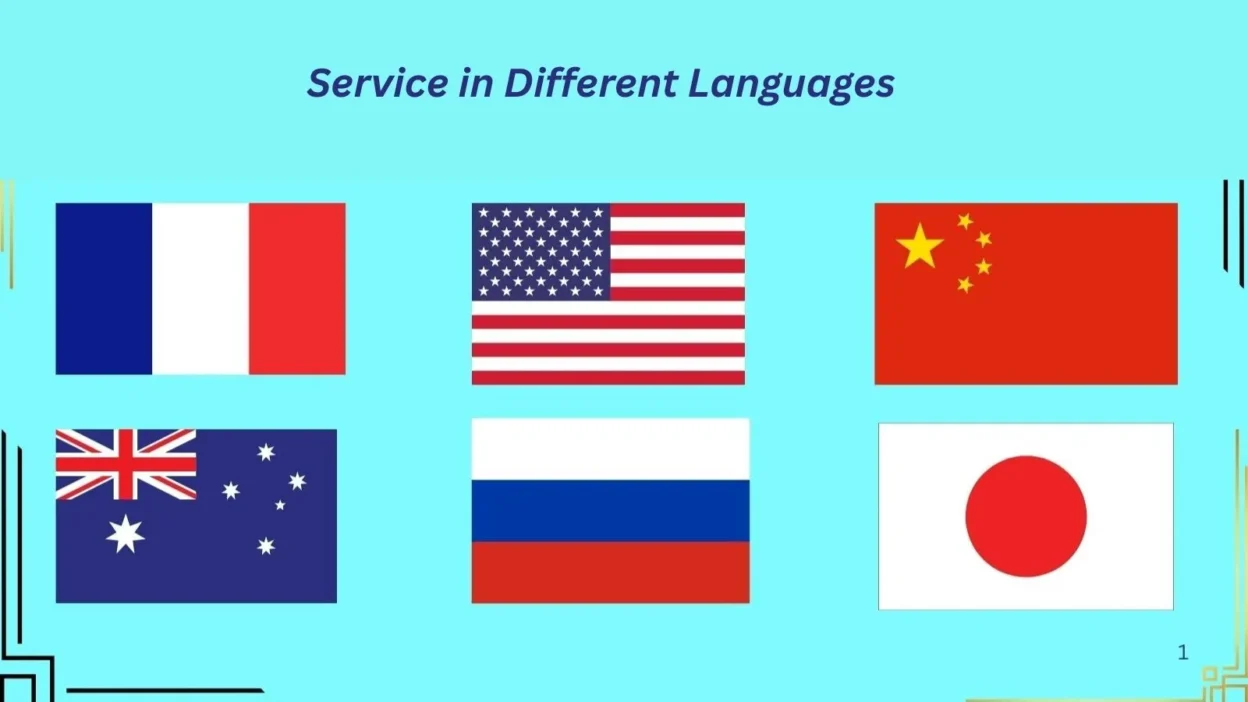When people search for “service in different languages”, they are usually looking for a way to communicate better across cultures, especially in business, hospitality, or everyday interactions.
Whether you are working in customer support, traveling abroad, or managing an international team, knowing how to say service in other languages can help you build trust and show respect.
This article will not only give you translations but also explain the meaning and usage of the word service, so you can confidently use it when talking to anyone around the world.
What Does “Service” Mean?
The word service generally refers to help, assistance, or an action done to benefit someone else. Depending on the context, it can mean:
- Customer service – providing support to clients.
- Public service – work done for the benefit of society.
- Religious service – a ceremony or gathering in faith traditions.
- Military service – duty in the armed forces.
Because the meaning changes with context, the translation of service in different languages may also vary.
Translations of “Service” in Different Languages
Here are some common ways to say service across the world:
- Spanish – servicio
- French – service
- German – Dienst / Service
- Italian – servizio
- Portuguese – serviço
- Dutch – dienst / service
- Russian – служба (sluzhba)
- Chinese (Mandarin) – 服务 (fúwù)
- Japanese – サービス (sābisu)
- Korean – 서비스 (seobiseu)
- Arabic – خدمة (khidmah)
- Hindi – सेवा (seva)
- Turkish – hizmet
- Greek – υπηρεσία (ypiresía)
- Swahili – huduma
1. Customer Service
- Refers to assistance provided by businesses to clients or customers.
- Examples:
- English: customer service
- Spanish: servicio al cliente
- French: service client
- German: Kundendienst
- English: customer service
👉 Use this when working in hospitality, retail, or support roles.
2. Public Service
- Refers to work or facilities provided by governments or organizations for society.
- Examples:
- English: public service
- Russian: государственная служба (gosudarstvennaya sluzhba)
- Greek: δημόσια υπηρεσία (dimosia ypiresía)
- Swahili: huduma ya umma
- English: public service
👉 Useful when discussing government jobs, utilities, or social programs.
3. Religious Service
- Refers to a formal gathering for worship or ceremony.
- Examples:
- English: church service
- French: service religieux
- Italian: servizio religioso
- Arabic: خدمة دينية (khidmah diniyyah)
- English: church service
👉 Common in faith-based communities or cultural traditions.
4. Military Service
- Refers to serving in the armed forces.
- Examples:
- English: military service
- German: Militärdienst
- Turkish: askerlik hizmeti
- Korean: 군 복무 (gun bokmu)
- English: military service
👉 Important in discussions of national duty or defense.
5. Technology and Digital Service
- Refers to internet-based or digital support (apps, platforms, online systems).
- Examples:
- English: online service
- Spanish: servicio en línea
- Japanese: オンラインサービス (onrain sābisu)
- Portuguese: serviço online
- English: online service
👉 Frequently used in IT, e-commerce, and global tech industries.
How to Use “Service” in Different Contexts
- In business or customer support: Use it when addressing clients, e.g., “customer service” → servicio al cliente (Spanish).
- In religion: For example, “church service” → culte (French).
- In public sectors: Like “postal service” → служба почты (Russian).
- In technology: Refers to digital or online services, often borrowed directly as “service” in many languages.
Why Learning “Service” in Different Languages Matters
- Improves cross-cultural communication – You’ll sound more polite and professional.
- Helps in global business – Essential in customer service, hospitality, and trade.
- Supports travelers – Makes it easier to ask for help or understand available services.
- Shows cultural respect – Using the local term leaves a positive impression.
Conclusion
Understanding service in different languages is helpful in business, travel, religious contexts, and even personal growth. Whether you’re asking for servicio in Spanish, fúwù in Chinese, or seva in Hindi, the right translation helps you connect better with people across the world.



